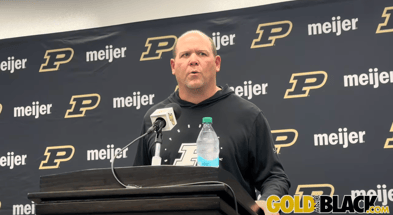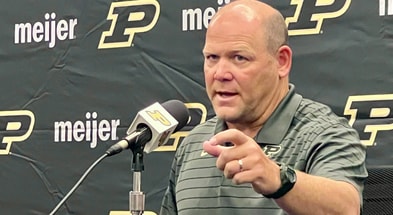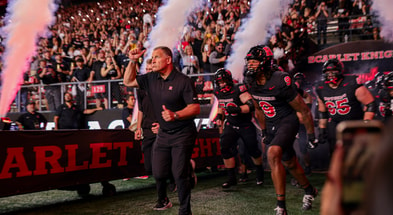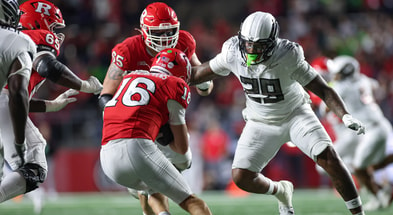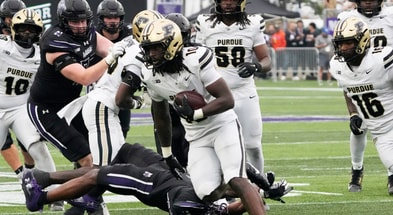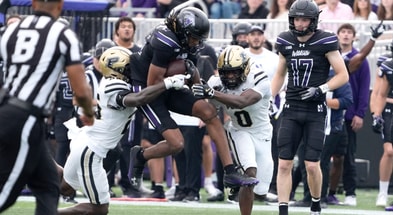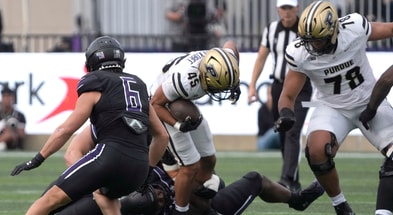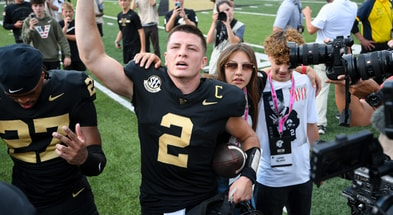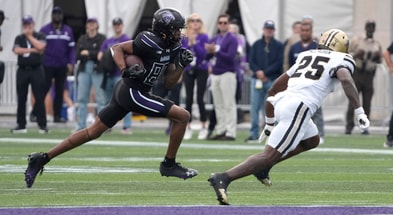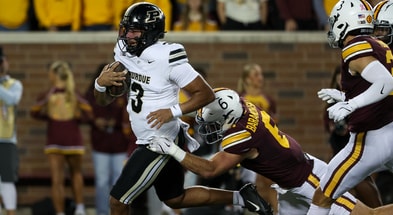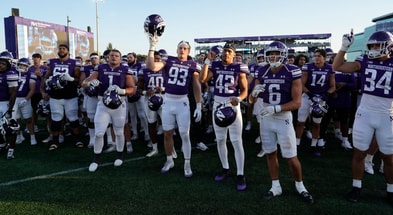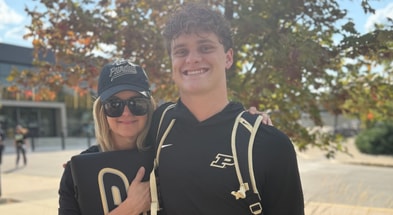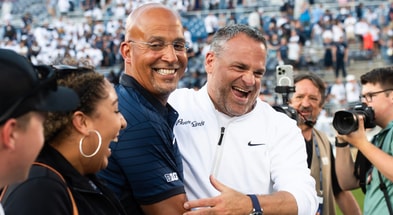Gold and Black Radio: Purdue's Rose Bowl season, state of Gold and Black and more

GoldandBlack.com publisher Alan Karpick joins host Derek Schultz for some discussion on the 2000 Rose Bowl team and its silver anniversary, plus Purdue football talk, the On3.com acquisition of Rivals and more.
Purdue legend Chukky Okobi talks Rose Bowl season
Purdue’s Offensive Line A Cast of Characters–Okobi at top of the list
Chukky Okobi has made a post-football career out of leadership and executive coaching, following the end of his football playing days. If there was any doubt that he would be good at it, all one has to do is go back to halftime of the Purdue-Michigan game of Oct. 7, 2000.
The Boilermakers, and their dream of making the Rose Bowl, were on the ropes. Purdue, with a 3-2 record and 0-1 mark in Big Ten play, trailed the Wolverines 28-10 at halftime. Consider this: No Purdue team before (or since, for that matter) has rallied from an 18-point deficit to win a game. But in the locker room at intermission, Okobi, a senior starting center, would hear nothing of it. And he made it clear to his teammates that the Boilermakers’ time was now.
“I remember jogging off the field, into the locker room and and I remember thinking, nothing’s changed,” Okobi said, referencing his player’s only meeting with the team the Thursday before the Michigan game when he called his teammates out to change the narrative of where the Boilermaker program was when Okobi and is band of fifth-year seniors arrived under Jim Colletto, and a 3-8 record, in 1996. “After the coaches made their adjustments (and a passionate speech by coach Joe Tiller) everyone’s getting hyped to go back onto the field, and I just scream. “I said, ‘Everybody just stop. Do you still believe me? They say, “yeah.” I said, Then let’s go. And we just went out there. And the rest is history, because that started a chain of events that led to us really owning our new identity as a program. It wasn’t just the Rose Bowl, it was about us owning who we were as a team.”
Okobi knew the narrative had changed at Purdue. After all, the Boilermakers were successful in the first three seasons under Tiller, part of one of the most significant program transformations in Big Ten football history. But it was getting to the next level and achieving something special that Okobi recalled was the real story of the 2000 season.
“When Coach Tiller came, everything changed, Okobi said. “And what “Coach Tiller changed was the way we looked at ourselves, the way that we saw ourselves, the way that what we believed the “P” on the side of our helmet meant, and he let us know that we had to define that.”
In other words, on that first Saturday in October, Okobi believed the Boilermakers had come too far to revert to program norms for past days, past coaches, and past players.
Purdue’s special teams had let the Boilermakers down in losses at Notre Dame and Penn State, and Okobi remembers thinking that had to change, because the Boilermakers were too good to let silly mistakes define them. And against Wisconsin, in a critical win in Purdue’s four-win march through October that delivered it to Pasadena, special teams came through.
Top 10
- 1New
'Neutral' Steve Spurrier
Reacts to Kiffin, Florida talk
- 2
National Title Odds
Big shakeup after Week 7
- 3
Mike Elko
Shreds media over PSU question
- 4Hot
More sign-stealing?
Lane Kiffin singles out OU
- 5
DJ Lagway
Addresses his future at Florida
Get the Daily On3 Newsletter in your inbox every morning
By clicking "Subscribe to Newsletter", I agree to On3's Privacy Notice, Terms, and use of my personal information described therein.
“When I in the NFL, (Okobi’s Pittsburgh Steelers) Coach (Bill) Cowher used to always say, special teams is a measure of how good your team actually is, because it involves both offense and defense. Our defense came through at Wisconsin when Akin’s big quarterback sack, but (the following play) in that moment, Craig Terrill wasn’t a defensive (or special teams player, he was just a Purdue Boilermaker, and his field goal block allowed us to do what he had to do to win. In sports, especially in football, you know, a lot of people get a lot of credit and a lot of people get a lot of blame when things don’t go well and the blame isn’t evenly distributed.
“Travis made the big kick at Michigan and Ashante (Woodyard) took it to the house after Craig’s block. My memory of all that is, we were a team in all phases.”
And a darn good team.
Okobi, who knew attention to detail was everything his role as center to Drew Brees, especially in the shotgun. So what does he recall about Brees’ fateful game-winning pass to Seth Morales that, in effect, delivered Purdue to Pasadena.
“The snap was a little too low,” Okobi said.
And his memory was right.
“I just remember how tired I was after that game,” Okobi says. We ran nearly 100 plays on offense against a very physical, talented Ohio State defense. And even in that moment when Drew threw that pick (the fourth interception that gave OSU the late lead before the Seth Morales heroics) Drew went over there and showed that he could play any position in football, the way he hit, (OSU defensive back) Mike Doss knocking him out of bounds.”
Brees’ hustle amid maybe the worst moment of the quarterback great’s college career, made a difference to his teammates.
“We were never out of the game with Drew,” Okobi said.
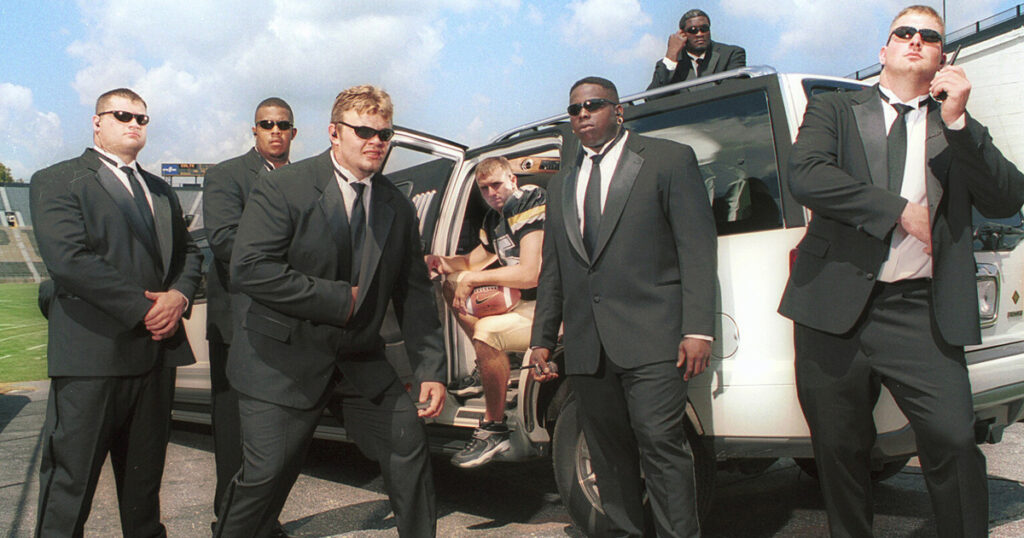
Gold and Black Illustrated Archives–2000 season game stories
Game 1: No. 15 Purdue 48, Central Michigan 0
Game 2: No. 14 Purdue 45, Kent State 10
Game 3: No. 21 Notre Dame 23, No. 14 Purdue 21
Game 4: No. 21 Purdue 38, Minnesota 24
Game 5: Penn State 22, No. 22 Purdue 20
Game 6: Purdue 32, No. 6 Michigan 31
Game 7: No. 21 Purdue 41, No. 17 Northwestern 28
The final five games will be added shortly.
Game 8: No. 17 Purdue 30, Wisconsin 24 (ot)
Game 9: No. 16 Purdue 31, No. 12 Ohio State 27
Game 10: Michigan State 30, No. 9 Purdue 10
Game 11: No. 17 Purdue 41, Indiana 13
Game 12: No. 4 Washington 34, No. 14 Purdue 24




